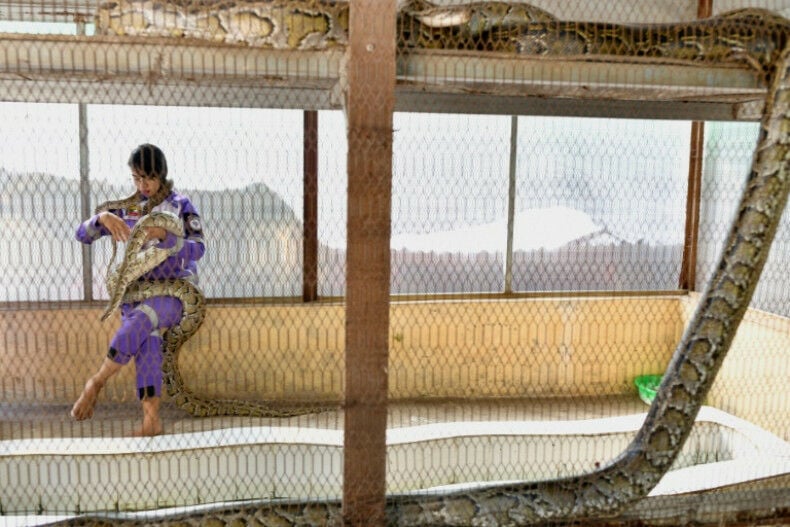Myanmar’s snake rescue squad’s mission to protect reptiles and humans

Shwe Lei and her team were outside a monastery in Yangon at 4am, struggling with 30 squirming pythons. They put them into old rice sacks and then loaded the sacks into a van. They were continuing their daily duty as part of Myanmar’s leading snake removal squad, tasked with freeing pythons and coaxing cobras from dangerous encounters with humans and then returning them to their natural surroundings.
The group had spent three months rescuing the snakes from domestic dwellings throughout Yangon and caring for them at the monastery before releasing them back into the wild. Shwe Lei maintains a deep-rooted affinity with snakes. She said…
“If you acknowledge their nature, they are lovely.”
Her mentor, 40 year old Ko Toe Aung, who has experienced seven hospitalisations since beginning the snake-catching venture in 2016, provided a more pragmatic point of view. Promptness and agility are essential skills for succeeding in this challenging profession, he said, and with venomous snakes, the risk of being bitten is always high.
The team, named Shwe Metta or “Golden Love” in Burmese, consists of around a dozen members who rescued around 200 snakes last year throughout Yangon. They have garnered the title of “prince and princess of snakes” from the local media due to videos showing their removal of snakes from various residences.
Day jobs
Dedicated to their pursuit, the team all have day jobs and depend on donations to provide their protective gear and fuel for their snake “ambulance.” The majority of snakes they catch are non-venomous Burmese pythons, which typically grow up to 5 metres in length and attack their prey by constriction. Venomous cobras and banded kraits, which can be lethal, are also found in the apartments of Yangon and present a more complex challenge.
More than 15,000 people in Myanmar were bitten by snakes in 2014, with 1,250 fatalities reported. This could be attributed to the country’s struggling healthcare system and limited availability of antivenoms. Removing snakes from residences is a risky endeavour, and the team must stay vigilant.
In fostering compassion towards the misunderstood reptiles, Shwe Metta hopes to increase awareness and understanding of their mission, allowing people to feel more at ease with the presence of snakes. She said…
“In the past people used to kill snakes whenever they found them but they have more knowledge and they know we can release them back into the wild.”
After being observed in a nearby monastery, the rescued snakes are released into the wild once their numbers justify the trip. In late March, the team embarked on an expedition to the Bago Yoma hills, 90 miles north of Yangon, to liberate the snakes.
A sense of satisfaction permeates the team as they relinquish the reptiles to their natural habitat. A contented Shwe Lei added…
“I feel happy releasing the snakes from the point of view of compassion for each other, it is satisfying.”
Latest Thailand News
Follow The Thaiger on Google News:


























